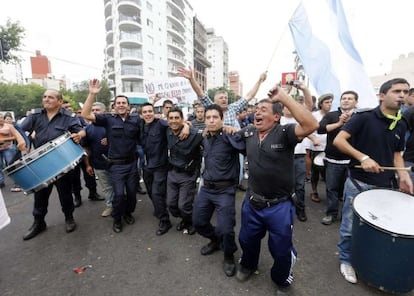At least eight dead and dozens injured in riots across Argentina
Police strikes in nine provinces spark wave of lootings and violence

Eight people were reported killed on Tuesday with more than 130 arrested across Argentina after a wave of lootings and unrest was ignited when local police officers went on strike in nine provinces.
The most volatile disturbances were reported in Córdoba – located 700 kilometers from the capital – where the lootings and riots began on the night of December 3. Since then, the violence has spread to other major cities. In Resistencia, Chaco province, four people died on Monday night in different incidents.
Outside Buenos Aires, a Chinese national was reportedly killed as he tried to defend his business from looters, who burned the establishment down. Buenos Aires governor Daniel Scioli cut short a trip to Rio de Janeiro on Sunday as the violence began to spread to his province. Before dawn Monday, one looter was electrocuted as he tried to break into a business in Concordia, Entre Ríos province.
“Police cannot go on strike because thieves never go on strike,” said Córdoba governor Juan Manuel De la Sota at a news conference, where he was accompanied by Cabinet chief Jorge Capitanich.
The police strike soon spread to other provinces, with officers threatening to walk off their jobs if the provincial governments refuse their demands for better pay.
Society and politicians have done something wrong”
The government of President Cristina Fernández de Kirchner called out 10,000 national gendarmes to help quell the violence.
“We haven’t gotten practically any sleep in 72 hours,” said Capitanich, who flew to Córdoba to try to help control the situation.
Opposition leaders and media outlets critical of the Fernández de Kirchner government have begun to suggest that there is a “deterioration of morals” around the country, with an attitude that “anything goes.”
Córdoba Senator Norma Morandini of the opposition Civic Front Alliance believes that the lootings are the result of the national government’s political failures.
“Just as we celebrate 30 years of peaceful democracy – far from a brutal repressive dictatorship – it is very sad that citizens believe that only the police can instill rule of law,” Morandini, a former journalist who used to work in Spain, told EL PAÍS.
“If a citizen who goes out every morning to buy bread and milk comes back at night to rob the same store, then the trouble cannot just be blamed on striking police officers. Society and politicians have done something wrong. We are headed in the wrong direction if the Gendarmerie has to be sent in to keep us from stealing,” she said.
One advertising executive who is critical of the Fernández de Kirchner government puts it another way: “The people see how Vice President Amado Boudou steals whatever he wants without going to jail, and they ask themselves why they can’t do the same.”
Boudou is the subject of several corruption investigations in connection to the selling of a printing plant while he served as economy minister. Fernández de Kirchner has given him her full support.
The government believes it is not a coincidence that the violence has taken place on the eve of the 30th anniversary of the restoration of democracy, which Argentineans were due to celebrate on Tuesday. Capitanich claims the lootings are an attempt to “destabilize” the country, and said there were similarities in the way police called the strikes in the different provinces, suggesting that the officers helped organize the unrest.
As of now, only Córdoba’s provincial minister for security, Alejandra Monteoliva, and police chief César Almada have been sacked because of the incidents.
Tu suscripción se está usando en otro dispositivo
¿Quieres añadir otro usuario a tu suscripción?
Si continúas leyendo en este dispositivo, no se podrá leer en el otro.
FlechaTu suscripción se está usando en otro dispositivo y solo puedes acceder a EL PAÍS desde un dispositivo a la vez.
Si quieres compartir tu cuenta, cambia tu suscripción a la modalidad Premium, así podrás añadir otro usuario. Cada uno accederá con su propia cuenta de email, lo que os permitirá personalizar vuestra experiencia en EL PAÍS.
¿Tienes una suscripción de empresa? Accede aquí para contratar más cuentas.
En el caso de no saber quién está usando tu cuenta, te recomendamos cambiar tu contraseña aquí.
Si decides continuar compartiendo tu cuenta, este mensaje se mostrará en tu dispositivo y en el de la otra persona que está usando tu cuenta de forma indefinida, afectando a tu experiencia de lectura. Puedes consultar aquí los términos y condiciones de la suscripción digital.








































